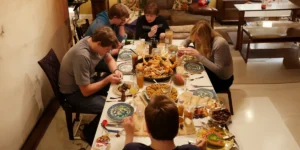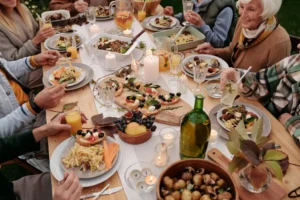
Our family has a long-standing tradition of hosting monthly dinners. This tradition, started by my grandmother, was continued by my parents and now by my siblings and me. The dinners were always special, with Dad going all out on decorations and Mom preparing several dishes.
When Megan and I started hosting, she took over cooking, finding it therapeutic. However, during one dinner, my family criticized her cooking harshly. Angela called the food bland, Dan complained about the chicken being dry, and Mom suggested using less seasoning. Megan was devastated.
Despite my support, the criticism persisted. When Megan tried cooking again, this time with my mom’s favorite roasted chicken and Angela’s beloved red sauce pasta, the comments were even worse. Angela said the pasta was awful, and Mom dismissed the chicken as not roasted properly. Megan was heartbroken and withdrew to the kitchen.

A family having dinner together | Source: Pexels
Overhearing my family’s negative comments, I confronted them, demanding they show more appreciation. The argument made Megan even more upset, leading me to suspect they were criticizing her intentionally.
To reveal the truth, we decided to test them. Megan cooked the same dishes again, but I claimed I prepared them. My family raved about the food. Angela called the pasta the best she’d ever had, and Dad praised my cooking skills.
I then revealed that Megan was behind the dishes they had previously criticized. The room fell silent, and my family tried to backtrack, but the damage was done. Megan and I realized the criticism was personal, not about the food.
We decided to stop attending the monthly dinners. My family’s complaints were rooted in deeper biases, as confirmed by Gloria. We chose to create our own traditions that emphasized respect and kindness, focusing on what truly matters: the love and support we share.





